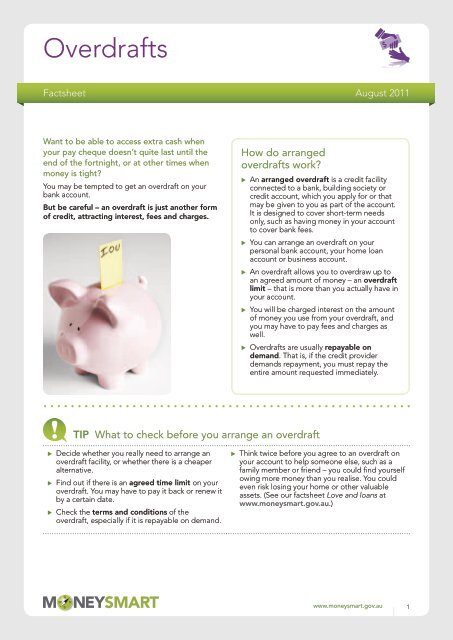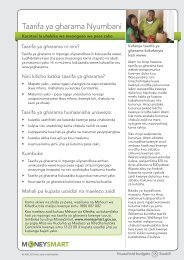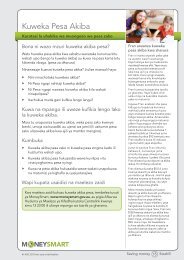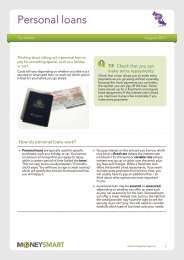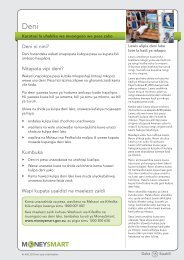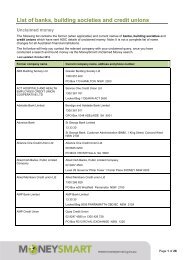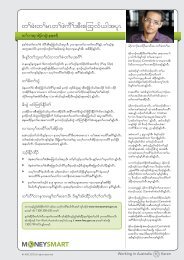Overdrafts - MoneySmart
Overdrafts - MoneySmart
Overdrafts - MoneySmart
You also want an ePaper? Increase the reach of your titles
YUMPU automatically turns print PDFs into web optimized ePapers that Google loves.
<strong>Overdrafts</strong><br />
Factsheet<br />
August 2011<br />
Want to be able to access extra cash when<br />
your pay cheque doesn’t quite last until the<br />
end of the fortnight, or at other times when<br />
money is tight<br />
You may be tempted to get an overdraft on your<br />
bank account.<br />
But be careful – an overdraft is just another form<br />
of credit, attracting interest, fees and charges.<br />
How do arranged<br />
overdrafts work<br />
XX<br />
An arranged overdraft is a credit facility<br />
connected to a bank, building society or<br />
credit account, which you apply for or that<br />
may be given to you as part of the account.<br />
It is designed to cover short-term needs<br />
only, such as having money in your account<br />
to cover bank fees.<br />
XX<br />
You can arrange an overdraft on your<br />
personal bank account, your home loan<br />
account or business account.<br />
XX<br />
An overdraft allows you to overdraw up to<br />
an agreed amount of money – an overdraft<br />
limit – that is more than you actually have in<br />
your account.<br />
XX<br />
You will be charged interest on the amount<br />
of money you use from your overdraft, and<br />
you may have to pay fees and charges as<br />
well.<br />
XX<br />
<strong>Overdrafts</strong> are usually repayable on<br />
demand. That is, if the credit provider<br />
demands repayment, you must repay the<br />
entire amount requested immediately.<br />
TIP What to check before you arrange an overdraft<br />
XX<br />
Decide whether you really need to arrange an<br />
overdraft facility, or whether there is a cheaper<br />
alternative.<br />
XX<br />
Find out if there is an agreed time limit on your<br />
overdraft. You may have to pay it back or renew it<br />
by a certain date.<br />
XX<br />
Check the terms and conditions of the<br />
overdraft, especially if it is repayable on demand.<br />
X X Think twice before you agree to an overdraft on<br />
your account to help someone else, such as a<br />
family member or friend – you could find yourself<br />
owing more money than you realise. You could<br />
even risk losing your home or other valuable<br />
assets. (See our factsheet Love and loans at<br />
www.moneysmart.gov.au.)<br />
www.moneysmart.gov.au<br />
1
<strong>Overdrafts</strong><br />
What are unarranged overdrafts<br />
XX<br />
An accidental or unarranged overdraft occurs<br />
if you make a payment but there are insufficient<br />
funds in your bank account to cover it. Your bank<br />
or building society honours the payment anyway,<br />
which creates a debt.<br />
XX<br />
While the policy varies between financial<br />
institutions, most cheque or savings accounts<br />
allow unarranged overdrafts to take place. You will<br />
usually find that you have agreed to this when you<br />
accepted the terms and conditions upon opening<br />
the account.<br />
XX<br />
Some banks will honour your overdrawn payment<br />
without charging you an unarranged overdraft<br />
fee, particularly if you are a valued customer or<br />
if it is your first time. Others will charge you a<br />
hefty penalty fee or a penalty interest rate on the<br />
overdraft amount.<br />
TIP Things to know about<br />
unarranged overdrafts<br />
XX<br />
Ask your bank about their policy on<br />
unarranged overdrafts, so that you are<br />
aware of the possible penalty fees and<br />
interest rates, should you exceed your<br />
available balance.<br />
XX<br />
Penalty fees for exceeding your available<br />
balance can be anywhere from $10 to $30.<br />
XX<br />
Some banks don’t charge a penalty fee,<br />
but impose a penalty interest rate on the<br />
overdrawn amount.<br />
XX<br />
Keep in mind that the amount overdrawn<br />
plus the penalty fee is repayable<br />
immediately.<br />
www.moneysmart.gov.au<br />
2
<strong>Overdrafts</strong><br />
Six steps to smarter borrowing<br />
Step 1. <br />
Work out if you<br />
can afford to<br />
borrow<br />
Step 2. <br />
Shop around<br />
for the best<br />
deal<br />
Step 3. <br />
Know who and<br />
what you’re<br />
dealing with<br />
Step 4.<br />
Keep up<br />
with your<br />
repayments<br />
Step 5. <br />
Get help if you<br />
can’t pay your<br />
debts<br />
XX<br />
Before you decide to get an overdraft, our budget planner at<br />
www.moneysmart.gov.au to see exactly where you spend<br />
your money and how much you can afford in repayments.<br />
XX<br />
Allow for interest rate rises and anything that might affect your future income<br />
(such as changing jobs).<br />
XX<br />
If the overdraft needs to be repaid on demand, how will you repay it<br />
XX<br />
If you do decide to arrange an overdraft facility, take the time to compare interest<br />
rates, product features and fees and charges. Even a small difference in the interest<br />
rate can make a big difference to what you have to pay. Shop around online to<br />
compare products or use our multi-loan calculator at www.moneysmart.gov.au.<br />
XX<br />
Anyone who wants to engage in credit activities (including brokers) must be licensed<br />
with ASIC or be an authorised representative of someone who is licensed. If they<br />
aren’t, they are operating illegally.<br />
XX<br />
There is currently an exemption from licensing for credit assistance provided<br />
through some businesses (for example, retail stores and car yards). While the store<br />
may be exempt, the actual credit provider must still be licensed. If you are unsure<br />
who the credit provider is, ask the person you are dealing with to point out the<br />
name in your credit contract.<br />
XX<br />
To find out if a credit provider is licensed, visit www.moneysmart.gov.au<br />
or call ASIC’s Infoline on 1300 300 630.<br />
XX<br />
Anyone engaging in credit activities (for example, by providing credit or assistance<br />
to you) must give you either a credit guide (with information such as their licence<br />
number, fees and details of your right to complain) or a written notice with details of<br />
your right to complain about their activities.<br />
XX<br />
You need to make sufficient repayments to keep the overdraft debt below the<br />
agreed limit. Even though your overdraft may not have a set repayment schedule,<br />
you could be charged penalty fees if you don’t pay the interest on time. And the<br />
sooner you pay off your balance, the less interest you’ll have to pay.<br />
XX<br />
Don’t forget to cancel the overdraft once you don’t need it anymore and it has<br />
been repaid.<br />
XX<br />
Act quickly if you are having trouble making repayments. It may be difficult to face<br />
the problem, but ignoring it will only make things worse.<br />
XX<br />
If you can’t make the full repayment, pay what you can. Contact your credit provider<br />
without delay.<br />
XX<br />
If you are experiencing financial difficulties, you have the right to apply to the credit<br />
provider for a hardship variation. If the credit provider refuses, you can complain<br />
to its independent dispute resolution scheme for a variation on the grounds of<br />
hardship (see step 6 below).<br />
XX<br />
There are places you can go for help – visit www.moneysmart.gov.au for sample<br />
letters and information about support services such as financial counselling and<br />
legal assistance, call the National Financial Counselling Hotline on 1800 007 007<br />
or call ASIC’s Infoline on 1300 300 630.<br />
XX<br />
See our factsheet Can’t pay your debts at www.moneysmart.gov.au.<br />
www.moneysmart.gov.au<br />
3
<strong>Overdrafts</strong><br />
Step 6. <br />
Complain if<br />
things<br />
go wrong<br />
XX<br />
Try to resolve your problem with your credit provider first.<br />
XX<br />
If you aren’t satisfied, take your complaint to your provider’s independent<br />
dispute resolution scheme. This will be either the Financial Ombudsman Service<br />
(FOS) at www.fos.org.au or the Credit Ombudsman Service Ltd (COSL) at<br />
www.cosl.com.au. Both schemes can be reached by calling 1300 780 808.<br />
XX<br />
If you think that a credit provider has acted unlawfully or in a misleading way, you can<br />
complain to ASIC online at www.asic.gov.au or call ASIC’s Infoline on 1300 300 630.<br />
www.moneysmart.gov.au<br />
ASIC Infoline: 1300 300 630<br />
Disclaimer<br />
Please note that this is a summary giving you basic information about a particular topic. It does not cover the whole of the relevant law regarding<br />
that topic, and it is not a substitute for professional advice.<br />
© Australian Securities and Investments Commission 2011<br />
www.moneysmart.gov.au<br />
4


